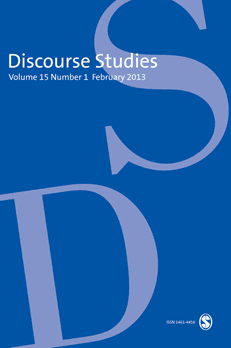
DISCOURSE STUDIES
Scope & Guideline
Fostering Critical Conversations Across Fields
Introduction
Aims and Scopes
- Critical Discourse Analysis (CDA):
The journal primarily focuses on critical discourse analysis, exploring how language constructs social realities, power relations, and ideologies across various contexts. - Interdisciplinary Approaches:
It fosters interdisciplinary research, integrating insights from linguistics, sociology, political science, and cultural studies to analyze discourse in its multifaceted forms. - Social Justice and Activism:
The journal emphasizes themes related to social justice, identity politics, and activism, promoting research that addresses marginalization and advocates for equity. - Ecolinguistics and Environmental Discourse:
There is a growing focus on ecolinguistics, examining how language shapes and reflects environmental issues and discourses surrounding climate change. - Digital and Multimodal Discourse:
The journal increasingly includes studies on digital communication and multimodal discourse, reflecting the impact of new media on language and societal discourse. - Political Discourse and Populism:
Research examining political discourse, particularly in relation to populism and the politics of exclusion, has become a significant area of focus.
Trending and Emerging
- Intersectionality and Gender Studies:
There is an increasing emphasis on intersectionality, particularly in relation to gender studies, exploring how multiple identities intersect in discourse and social contexts. - Climate Change and Environmental Discourse:
Research focusing on climate change discourse is trending, highlighting the role of language in framing environmental issues and the urgency of sustainability. - Digital Discourse and Social Media Analysis:
The rise of digital communication platforms has led to a surge in studies analyzing discourse on social media, reflecting its significant role in shaping public opinion. - Indigenous and Postcolonial Discourses:
Emerging themes related to Indigenous and postcolonial discourses are gaining traction, addressing the complexities of identity and power in postcolonial contexts. - Health Communication and Pandemic Discourse:
The COVID-19 pandemic has spurred interest in health communication and the discourse surrounding public health, reflecting the importance of language in crisis management. - Political Populism and Right-Wing Discourse:
There is a notable trend in analyzing political populism and the language of the far-right, reflecting current global political dynamics.
Declining or Waning
- Traditional Linguistic Analysis:
There is a noticeable reduction in papers focusing solely on traditional linguistic analysis without a critical or social perspective, indicating a shift towards more socially-oriented studies. - Historical Discourse Analysis:
The exploration of historical discourse analysis seems to be waning, with fewer studies dedicated to examining historical texts or contexts in favor of contemporary issues. - Narrowly Focused Case Studies:
Research that focuses on very narrow or localized case studies without broader implications or connections to larger social issues appears less frequently. - Theoretical Discourse without Empirical Application:
There is a decline in purely theoretical discourse studies that do not engage with empirical data or real-world applications, as the journal emphasizes practical relevance.
Similar Journals

Revista da Anpoll
Advancing knowledge in Letters and Linguistics.Revista da Anpoll is a prestigious academic journal dedicated to the fields of Letters and Linguistics, published by the ASSOC NAC POS-GRADUACAO PESQUISA LETRAS & LINGUISTICA in Brasilia, Brazil. Since its inception in 1994, this Open Access journal has aimed to foster scholarly communication and lead discourse in the linguistic and literary disciplines, allowing researchers and practitioners free access to cutting-edge research and findings. Although it does not currently have an H-index, the journal continues to attract high-quality submissions from experts in its field, contributing to the global academic community. By offering a platform for innovative studies and discussions, Revista da Anpoll plays a critical role in advancing knowledge and practice within linguistics and literary studies, making it an invaluable resource for academics, professionals, and students alike.

GEMA Online Journal of Language Studies
Elevating Academic Excellence in Language Research.GEMA Online Journal of Language Studies, published by Penerbit Universiti Kebangsaan Malaysia, is a prominent open-access journal dedicated to advancing research in the fields of Linguistics, Language, and Literature. Since its inception in 2001, the journal has been committed to providing a platform for scholarly articles that push the boundaries of knowledge and foster dialogue among professionals, researchers, and students alike. With its impressive impact reflected in the 2023 Q1 category rankings in both Linguistics and Language as well as Literature and Literary Theory, GEMA has established itself as a leading authority, achieving a notable rank of #17/1106 in its fields on Scopus, reflecting its high percentile of 98. The journal spans an extensive range of topics relevant to language studies, emphasizing integration and innovation from 2009 to 2024. Researchers looking to disseminate their findings or keep abreast of the latest developments will find GEMA an invaluable resource in the pursuit of academic excellence and a deeper understanding of language dynamics.
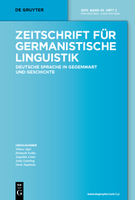
ZEITSCHRIFT FUR GERMANISTISCHE LINGUISTIK
Pioneering Research in Linguistics Since 1973ZEITSCHRIFT FUR GERMANISTISCHE LINGUISTIK, published by WALTER DE GRUYTER GMBH, stands as a pivotal resource in the field of linguistics since its inception in 1973. With its ISSN 0301-3294 and E-ISSN 1613-0626, this esteemed journal serves as an essential platform for researchers and academics focused on the nuances of the German language and its linguistic frameworks. Catering to a diverse audience, the journal features high-impact articles and contributions consistent with rigorous academic standards, as evident from its Q1 categorization in Linguistics and Language and its notable rankings in both the Arts and Humanities and Social Sciences domains. The journal's commitment to advancing knowledge in linguistics fosters a scholarly environment conducive to both emerging and established linguists. While not available through open access, ZEITSCHRIFT FUR GERMANISTISCHE LINGUISTIK remains influential, drawing readers keen on exploring developmental and educational paradigms alongside linguistic theories. With a convergence of research that spans until 2024, it represents a comprehensive body of work integral to the evolving landscape of linguistic studies in Germany and beyond.
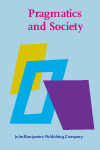
Pragmatics and Society
Innovative Research at the Crossroads of Linguistics and SocietyPragmatics and Society, published by John Benjamins Publishing Co, is an esteemed journal that serves as a vital platform for the interdisciplinary exploration of language use in social contexts. Established with the aim of bridging the gap between pragmatics and social theory, this journal covers innovative research and critical methodologies within linguistics and language studies. With an impressive impact factor and recognition as a Q2 journal in the field of Linguistics and Language for 2023, it ranks notably within the 75th percentile for Arts and Humanities and 73rd for Social Sciences. Based in the Netherlands, Pragmatics and Society is dedicated to fostering scholarly discussions and advancing knowledge in areas such as discourse analysis, sociolinguistics, and communicative practices. Researchers, professionals, and students alike will find this journal to be an invaluable resource for understanding the complexities of language in society and are encouraged to engage with its rigorous publications.

Circulo de Linguistica Aplicada a la Comunicacion
Connecting Ideas Across Linguistic FrontiersCirculo de Linguistica Aplicada a la Comunicacion is a premier open-access journal published by UNIV COMPLUTENSE MADRID, SERVICIO PUBLICACIONES, since 2000, that serves as a vital resource for researchers, professionals, and students in the fields of linguistics and language studies. With an ISSN of 1576-4737, this journal is recognized for its rigorous scholarship and has achieved a notable Q1 quartile ranking in Linguistics and Language as of 2023. The journal's impact extends across diverse domains, holding significant positions in both the Arts and Humanities and Social Sciences categories, ranking #354/1088 and #419/1167 in Scopus, respectively. It features a rich array of research articles that delve into applied linguistics, communication theories, and language pedagogy, creating a comprehensive platform for academic discourse. By fostering collaboration and innovation in language research, Circulo de Linguistica Aplicada a la Comunicacion remains a crucial contributor to the enrichment of knowledge and understanding within the global linguistic community.
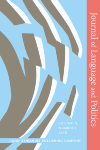
Journal of Language and Politics
Examining the Nexus of Communication and GovernanceThe Journal of Language and Politics, published by John Benjamins Publishing Co, stands at the forefront of interdisciplinary research, merging the fields of linguistics, political science, and sociology. With an ISSN of 1569-2159 and an E-ISSN of 1569-9862, this esteemed journal has been a pivotal platform for scholarly discourse since its inception in 2002. As of 2023, it holds a prestigious Q1 ranking in multiple categories, including History, Linguistics and Language, and Sociology and Political Science, showcasing its significant impact and relevance within the academic community. Researchers, professionals, and students will find a wealth of rigorously peer-reviewed articles that explore the intricate ways language influences political behavior, social structures, and cultural discourse. Although not an open access journal, it remains an essential resource for those invested in understanding the dynamic interplay between language and politics, enriching the study of social phenomena on a global scale.

DEUTSCHE SPRACHE
Unraveling the Nuances of the German LanguageDEUTSCHE SPRACHE, published by Erich Schmidt Verlag, is a pivotal journal dedicated to the intricate study of the German language. With its ISSN 0340-9341 and E-ISSN 1866-5233, this publication serves as a vital resource for linguists, educators, and language enthusiasts alike. Spanning diverse topics within the fields of linguistics and language, psychology, and social sciences, the journal has earned a Q3 ranking in Linguistics and Language, alongside a Q4 ranking in both Psychology (miscellaneous) and Social Sciences (miscellaneous) as of 2023. Although the journal is not Open Access, it provides invaluable insights on the developments in German language research from its convergence years of 2002 to 2011 and 2017 to 2023. Positioned in Berlin-Tiergarten, Germany, DEUTSCHE SPRACHE continues to expand its influence and accessibility to researchers, professionals, and students keen on understanding the nuances of linguistic expression in the German language.

International Review of Pragmatics
Innovating Research in Linguistics and PsychologyInternational Review of Pragmatics is a leading scholarly journal published by BRILL, renowned for its contribution to the fields of Communication, Linguistics and Language, and Psychology. With an ISSN of 1877-3095 and an E-ISSN of 1877-3109, this journal offers a rigorous platform for high-quality research and theoretical contributions that explore the complexities of pragmatics across various domains. Situated in the Netherlands, the journal is currently ranked in the Q2 quartile for both Communication and Linguistics, reflecting its substantial influence and academic excellence. The Scopus rankings further emphasize its importance, with percentile rankings in the 55th to 78th range across several relevant categories. Since its inception in 2014, the journal has consistently pursued the objective of fostering interdisciplinary dialogue and advancing scholarly discourse in pragmatics. Although the journal does not currently offer open access options, it remains committed to accessibility in academia through various channels. Researchers, professionals, and students alike will find valuable insights and contemporary discussions that propel the field forward, making International Review of Pragmatics an essential resource for those dedicated to understanding the intricacies of human communication.
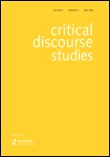
Critical Discourse Studies
Unpacking the Complexities of Communication and CultureCritical Discourse Studies is a leading journal in the field of discourse analysis and communication, published by Routledge Journals, a prestigious imprint of Taylor & Francis Ltd. Established in 2005, it has garnered a significant reputation for its rigorous scholarly articles that explore the intricate relationships between language, power, and social practices. With an impressive Q1 classification in Social Sciences (miscellaneous) as of 2023, the journal serves as an essential platform for researchers, professionals, and students seeking to delve into critical perspectives on discourse analysis. Although not open access, its comprehensive peer-reviewed articles are instrumental in advancing understanding in areas such as sociolinguistics, cultural studies, and communication theory. Critical Discourse Studies thus stands as a vital resource for those engaged in the study of discourse and critical theory, consistently contributing to the dialogue on how language shapes and is shaped by societal structures.
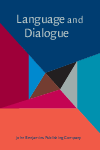
Language and Dialogue
Bridging Disciplines through Language and DialogueLanguage and Dialogue is an esteemed journal published by JOHN BENJAMINS PUBLISHING CO, focusing on the interdisciplinary intersections of language use, cultural studies, and literary theory. With an ISSN of 2210-4119 and an E-ISSN of 2210-4127, the journal has established itself as a prominent platform for high-quality research since its inception in 2011. Notably, it is ranked Q1 in Cultural Studies and Literature and Literary Theory, reflecting its prestigious standing in these fields, and has impressive Scopus rankings that further underline its scholarly impact within the arts and humanities. Based in the Netherlands, Language and Dialogue is committed to advancing the understanding of dialogue's role in language and communication, providing a vital resource for researchers, professionals, and students alike. Although not an Open Access journal, it ensures access to cutting-edge research through institutional subscriptions, making it an essential addition to any academic collection in the humanities and social sciences.